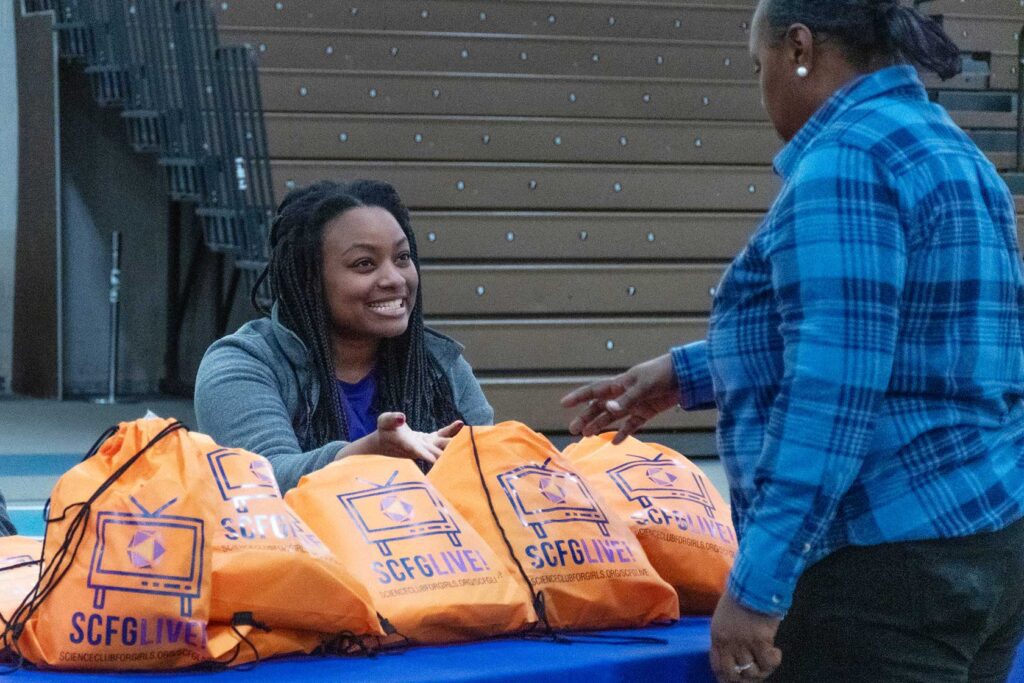
As the world reels from a pandemic, climate change and artificial intelligence, the workforce in science, technology, engineering and mathematics continues to face racial and gender disparities.
That is what Science Club for Girls is attempting to change. The Cambridge nonprofit offers after-school, hands-on science courses for girls and gender-expansive youth, especially from communities of color and low-income communities — groups that are often underrepresented in STEM fields.
The club’s courses, offered for free to students in kindergarten through eighth grade, are conducted by volunteer mentors who are mostly women of color working or studying in STEM fields. The organization aims to grow the number of female scientists and engineers of color.
According to data from Catalyst, a nonprofit focused on gender equity in the workforce, only about 4% of scientists and engineers in the United States in 2019 were Black and Hispanic women.
That lack of diversity is important when considering the ways that STEM impacts daily life, said Bonnie Bertolaet, executive director of Science Club for Girls.
“Right now, we just have such a narrow, narrow band of talent working on these problems,” Bertolaet said. “These problems are only going to get more complex, and we’re really limiting ourselves by not having all the talent that we have available to us to bear on these issues and really bring it to the proverbial STEM table.”
Science education also provides a range of benefits for students. Ivy Morgan, director of pre-K-to-12 data and analytics at the Education Trust, said participation in STEM programs provides students with critical thinking, creativity, problem-solving and other important skills that will be valuable in future careers.
“If we are systematically denying students of color, students from low-income backgrounds [and] girls access to those programs, then that means that the future workforce that we’re creating [and] … preparing students for will also similarly deny those students … the opportunities to participate in the same fulfilling ways as their as their peers,” Morgan said.
Outside of science education, Science Club for Girls also focuses on social-emotional learning and leadership skills.
The organization starts young, with offerings for kindergartners. That early start is, in part, intended to help girls understand that they can pursue interests in science, too.
Bertolaet pointed to research from 2011 that found gender stereotypes about math can develop as early as second grade.
“We’re one of the few programs that really emphasizes elementary education in STEM. …This is something that [students] know how to do, that they feel familiar with,” she said. “They have seen — from when they were kindergartners — adult women who do this.”
Ashley Cooper, who volunteered as a mentor while studying neuroscience and social anthropology at Harvard, recalls a second-grade participant expressing that she wasn’t sure if STEM was right for her. That same student continued with the program for years and is now a junior mentor, Cooper said.
“As a Black woman, I’ve seen our populations be the most underserved historically, so I think it’s a beautiful thing to redress this harm that’s been done, and this inequity,” said Cooper, the organization’s curriculum and evaluation manager.
Cooper said a sense of mystery around STEM topics can be a barrier to understanding and inclusion.
“That’s something that’s really unique about it, and why it’s so necessary to expose students to this information really early on — even at the age of kindergartners — and just know that they can engage with these topics, because it really demystifies the content quite a bit,” Cooper said.
Students need to feel like they belong, according to officials at the Education Trust, which is producing a soon-to-be-released report examining inequitable access to advanced courses in high school, Morgan said.
The report found that after taking advanced courses, especially in math, high-achieving students of most racial backgrounds expressed a higher sense that they were part of the fabric of their school community, Morgan said. However, that sense of belonging did not translate to high-achieving Black students, who tended to feel a similar level of belonging whether they took the advanced courses or not.
That data suggests that more work is needed to create a positive school climate, Morgan said. Fostering positive relationships between staff and students can improve equity and access to advanced coursework, especially for students of color and for girls.
Over the past five years, Science Club for Girls has expanded its offerings to include digital programming, which Bertolaet said has “opened up STEM learning” to students.
This work comes as organizations across the Greater Boston have stepped up efforts to help residents of color access jobs in STEM fields, especially in life sciences and biotechnology, with training programs and resources such as Bioversity and the MassBioEd Lifesciences Career Hub.
Science Club for Girls takes a wider approach. Each semester, the club tackles a different area of STEM — with a broad scope of topics students study. Semester themes include evolutionary biology and archeology; biotechnology; and architecture and engineering.
Bertolaet said that to have a scientifically literate community, her organization seeks to expose people to all kinds of STEM fields and problems.
“It’s not just life sciences and biotechnology,” Bertolaet said. “All kinds of STEM touch our lives and we want girls to be able to make sense of their world, to interact with their world, to feel empowered by their STEM knowledge, to enjoy it, and to revel in the wonder of STEM.”






